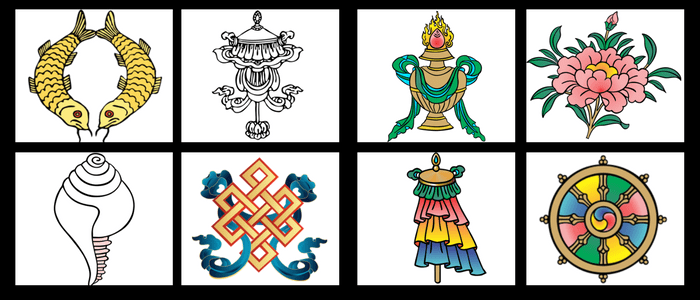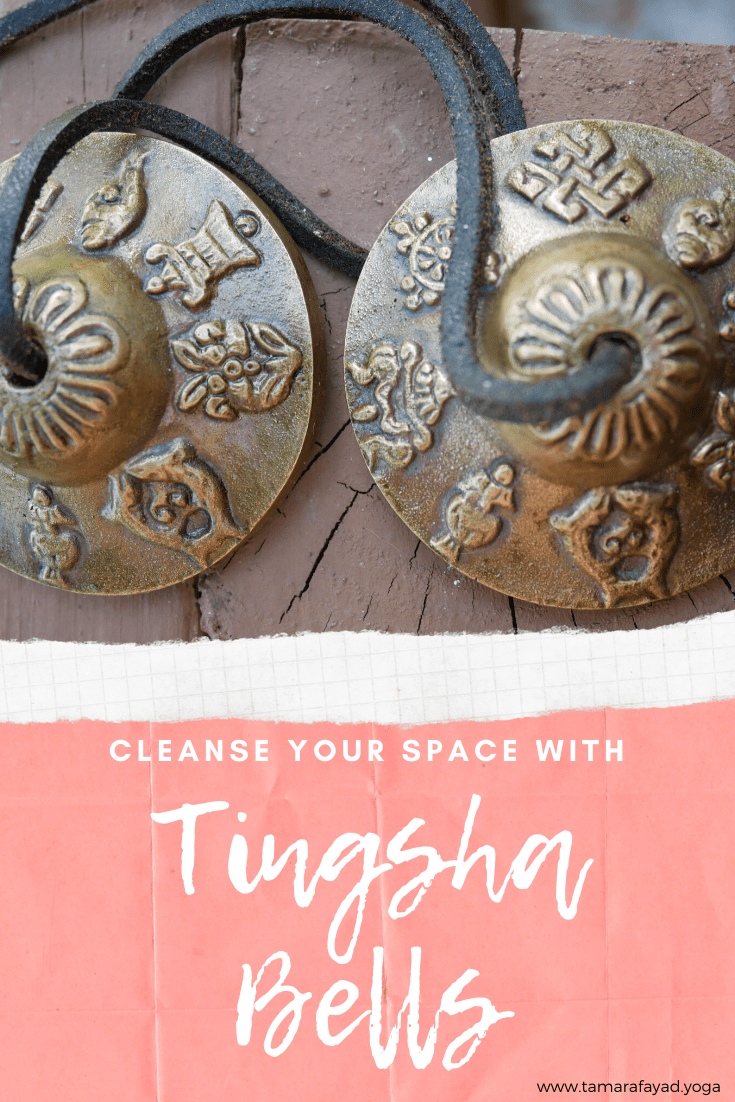The Meaning and Uses of Tingsha Meditation Bells

We all have most likely heard the Tingsha meditation bells during a yoga class. They’re that high pitched bell sound that you’ve probably heard at the beginning of your class during pranayama or perhaps at the end during your final resting savasana. The Tingsha Bells are usually accompanied by other Tibetan singing bowls, gong sounds, or crystal bowls, and other instruments, whether you are hearing it live or on a record. These sounds and instruments are great to listen to during your yoga or meditation practice. But, did you know that most of these instruments and sounds have deeper meanings attached to them.
Today we will be exploring the meaning of the Tingsha meditation bells.
The Structure of the Tingsha Meditation Bells
The bells are not very thin like musical cymbals they are actually quite thick. They are also not used like musical cymbals, by banging the two flatter surfaces together. They are played by hitting the two edges together and then allowing them to move apart from each other so that the tone can resonate throughout the room.

The sound that comes from these bells is a high pitched cleansing sound and vibration. The small bells originate in Tibet and are used by Buddhist practitioners. I received my pair when Tibetan Buddhist Monks came to the Coral Springs Museum of Art to do their annual Sacred Art Tour. I also had the pleasure of sharing lunch with a few of the monks and some yogini friends of Yoga 4 Life Studios in Coral Springs.
Symbolism
Some bells come without any symbols attached to them but some include the 8 auspicious symbols, like mine. The Ashtamangala (8 auspicious symbols) are made up of 8 different symbols that have significance in not only Buddhism but also in other Indian religions. They are symbols of good fortune and an enlightened mind.

1. Golden Fishes
The Golden fishes represent breath & prana (life force) because they are reminiscent of the ida and pingala energy channels of the body which regulate the breath.
Other forms of symbolism from these fish include freedom & abundance with the fish having complete freedom of movement throughout the water.
2. Parasol
The Parasol represents protection from harm and illness, just like a parasol protects from the sun. It also represents the expansiveness of your crown chakra, through the expansiveness of the canopy.
3. Treasure Vase
The Treasure Vase represents health, longevity, prosperity, and empowerment. This symbol is seen a lot through different sects of Buddhism.
4. Lotus
Through the lotus we see purity of the mind, body, & speech represented. With non-attachment we can find this purity within. The lotus floats above the muddy waters of attachment & desire, as should we.
5. Conch Shell
The conch shell is a symbol that is seen with many deities, it is how these deities spread their message. Therefore, the conch represents educating and taking care of yourself.
6. Endless Knot
The Endless Knot show that everything in life is interwoven and interdependent. Your future outcomes are rooted in what you do today.
7. Victory Banner
This is the type of banner that was flown once battles were won. The Victory Banner represents overcoming defeat & attaining happiness.
8. Dharma Wheel
The Dharma Wheel represents all of Buddha's teachings. The wheel is a symbol of the never ending journey to self improvement. There is no end.
How Can You Use the Tingsha Bells
Using Tingsha Bells in Yoga Class
Tingsha Bells can be used in yoga classes, as mentioned before at the beginning or end. The bells can be used at the beginning of class to help students settle in to their mats and to their practice, it can also be used in assisting the flow of the breath. Tinging them one time for the inhale and one time for the exhale.
Using Tingsha Bells for Sound Healing and Meditation
Tingsha Bells can be used in yoga classes, as mentioned before at the beginning or end. The bells can be used at the beginning of class to help students settle in to their mats and to their practice, it can also be used in assisting the flow of the breath. Tinging them one time for the inhale and one time for the exhale.
Clearing Space and Feng Shui
These versatile bells aren’t just used for meditation and yoga practices in western modern times. They can also be used for Feng Shui and clearing space. The purifying tone of these bells are rung in each corner of a room for Feng Shui. They are used for clearing auras and are said to “fill” empty space.
The higher frequencies of these bells are typically used more for opening the upper chakras rather than the lower chakras which usually have a lower deeper tone.



Does it matter which symbols are used for what? EXAMPLE if im clearing a space does it matter which symbols are on my bells?
Hi Kim! The symbols don’t matter for clearing space, its the vibration of the bells that clears the space. The symbols are just sometimes added to the bells.
Thank you so much for sharing this information.
I just got some of these bells today and don’t no how to use them or what to use them for in my home
Thanks for your comment Sarah! Hopefully, this post can help you figure out how to use them in your home. We love using them for cleansing the space and meditation.
Hi Tamara. I first found out about tingshas at a workshop. The facilitator used them as a way to gather the attention of the participants. Is this an appropriate use of the tingshas? I ask because I myself now have a pair of them which I have used during meditation. I am wondering if it is appropriate for me to use them when facilitating workshops that are not related to Yoga or Buddhism. Thank you so much for your response.
Thanks for your comment, Stephanie. I would say that if your intention is to gently bring the audience/group into the present moment it would be appropriate to use the bells. A few peaceful chimes will help bring awareness to the audience and clear the energy for you to begin your workshop on a nice note.
Hello! What is the appropriate way to store my bells? I would like to hang them next to my singing bowl, but is it best to have them stored lying flat or in a pouch? I was gifted them, so they came alone. Thank you for this post and your help!
Hi Lindsey, Thanks for the comment.
I personally store mine in a pouch. I think hanging them would be okay if you want that aesthetic with the singing bowl but I would just be cautious to be sure that the strap holding the bells together doesn’t get worn from hanging.
Thank you so much Tamara what lovely and complete explanation …I have had these for years but didnt know ALL this …thank you again for sharing and stay safe.xGill
I am glad you enjoy the read Gill!
Thank you for sharing, this was informative. 🙏💞
Thank you!!
They come in different sizes. What would be the best size to use for reiki practice?
Hi Patti, I would ask about the frequency of the different sizes and choose one that resonates with your reiki practice.
Greetings,
I wanted to inquire about the upkeep of the bells. What do you suggest is the best way to clean the bells? Mine are a bit tarnished and I wanted to spruce them up if possible. Also, if the strap brakes, what do you suggest or what is the traditional strap material if it needs to be replaced?
Thanks so much for your explanation of the symbols on the bells, I found it very informative and enlightening. ^_^
Hello,
For cleaning, I would take into consideration the material of the bells. Usually they are brass, or copper. Look up how to clean brass/copper and you can use a natural solution or buy a store bought one. I’m always a fan of non-toxic solutions you can make at home. As for the strap, most are done with leather straps or some sort of rope, You can try and DIY that yourself too or take it to your local crystal or new age shop and they may be able to help.
Hi there. My bells have the number 5 on the underside of them. Can you please tell me what that means.
Thankyou
Can you tell me what it means when they are used to cleanse a person’s energy wave lengths? My friend used them on me.. and the sound it ommited was off key and wavey and distorted it was not a single smooth tone. I instantly felt this feeling of tension and it put me in fight flight mode. I’ve never had this reaction to singing bowls. The chimes didn’t seem to like me and vise versa.. any insight??
This one is a bit complex, there are a lot of things that could be the reason for your reaction and it can be a combination of things. I’d be sure the bells are the right quality, something low quality can just be off/not matching with both cymbals (that would be the easy answer). The next would be the frequency. The frequency of the Tingsha’s are higher, normally above 2000 which opens the upper chakras, you could be having some blockages there.
Just a response to Quinton.
I use sound as a healing modality. The frequency/sound vibrations, from tingshas, tuning forks, singing bowls, can sound different when working around your energy ports/chakras.
I can tell by the sound what chakras are most out of balance. If there is an area that “sounds” out of tune when I am working, I know it needs a bit of work to bring it back “in tune.”
It could be the reason the sound is effecting you so strongly.
You could have her try it again and see if your reaction is any different.
Blessings
Sonoma
Great advice Sonoma!
I just bought Tingsha Bells what’s a dragon design. Does that mean anything? The sound is exactly the same very refreshing
I’m not familiar with a dragon design, will have to look that one up. Yes I love the sound of the bells.
I bought some tingsha bells but there are only 7 symbols and none of them are what you have shown here. Does it matter or can mine be used the same way?
Hi Carolyn, the symbols are just an added customization on the bells. Some have them and some don’t. The bells can still be used in the same way.